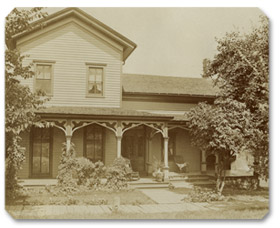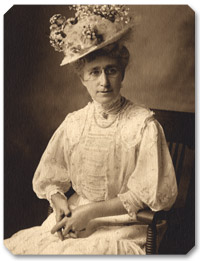|
CHAPTER ONE In the midwestern town of Glen Ellyn, Illinois, on an early winter day in 1911,the same year the French actress Sarah Bernhardt toured the United States, Marie Curie received her second Nobel Prize in chemistry, and thousands of women marched for women's suffrage in New York and London,a first child was born to twenty-six-year-old Kenneth Neel Critchfield and twenty-four-year old Jessica Higley Critchfield. Virginia Critchfield was born on December 7 in the front parlor of her maternal grandparents' home, a late Victorian residence on Duane Street. Present at Virginia's birth were her grandfather, Dr. E. S. Higley, a physician; her grandmother, Cora V. Higley; and a nurse, Mrs. Helen Lennicke, who presented the newborn baby with the gift of a bonnet. In a black-and-white photograph of the Higley parlor, a grand piano, brilliantly polished, sits in one corner of the room, sheet music arranged above the keyboard. Next to the imposing instrument rests a music stand upon which the pages of a score have been left invitingly open. Behind these, a full-length window covered with a plain sheer panel allows a measure of subdued light into the room. In another photograph of the room, a sawtooth fern droops on a delicate side table beside a stout armchair crowded with tasseled velvet cushions. A somber oriental pattern papers the walls of the high-ceilinged parlor, where photographs (presumably of family members) as well as several obscure landscapes hang at irregular intervals. The parlor gives the impression of a modestly appointed, unpretentious midwestern residence at the turn of the century, a middle-class home that reflects domestic order, civility, and an appreciation of the arts. Virginia's grandmother, Cora, was a Christian Science practitioner who also served as president of both the Glen Ellyn Women's Club and the Glen Ellyn Library Association. On March 24, 1981, in a letter to Reverend Francis Moore, Virginia wrote the following: I, too, had a very special grandmother, a tiny, fragile lady with white "puffy" hair, an aristocratic black velvet ribbon around her neck, and seeming always to trail the gentle scent of jasmine. She was, despite her diminutive appearance, a strong, indomitable woman who made speeches, who drove an automobile long before other women, who championed human rights, and whose eyes twinkled as she wove fantastic stories for wide-eyed children or stirred up delectable pots of fudge. How fortunate we are to have had these wonderful people in our lives and how precious are the memories in which they figured so prominently, so meaningfully. The seeming contradiction between a diminutive lady with twinkling eyes who trailed "the gentle scent of jasmine" and a woman who championed the rights of others, traveled alone, made speeches, and generally challenged behaviors judged appropriate for women at the close of the Victorian era, reflected conflicting social expectations and cultural tensions of American women between 1890 and 1920. Virginia was born in the middle of this change. As the nation emerged into a more modern, urban, industrial, and bureaucratic era, women of the upper, middle, and working classes,in uneasy alliance,advocated for voting rights and political reforms, broader educational opportunities, and safer, unionized work environments. Modern advances reduced domestic labor, opening new opportunities for leisure and pleasurable consumption, for increased education, and for the formation of collective alliances, such as settlement houses, labor unions, and women's clubs, and larger political alliances, such as the National American Woman Suffrage Association. Women in newly significant numbers were going outside their homes to engage in civic-minded activities, social reforms, and political rallies, breaking down Victorian notions of gender segregation and beliefs about the limits of women's intellect and abilities. With the collective power of independent, middle-class women such as Cora Higley and like-minded women from other socioeconomic groups, the social and political parameters of American women's lives expanded. By her strong example of civic leadership and spiritual ministry, Cora Higley demonstrated the ability to embody leadership in the presence of seemingly contradictory interests and actions to the granddaughter she affectionately nicknamed "Little Bird." In contrast is young Jessica Higley, Virginia's mother, whom we can observe in a sepia photograph, her head wrapped loosely with a long, knotted bohemian scarf. Wearing rings and bracelets on her fingers and wrists, Jessica, perhaps twenty, stares into the camera with an insouciant artistic flair. Jessica, a trained pianist, taught music and enjoyed a brief career as an accompanist to the silent movies, memorizing over five hundred songs and providing a musical education to her daughters and entertainment to friends. Growing up with the differing examples of temperaments and roles that her grandmother and mother provided, Virginia would inherit and develop her own traits of civic leadership, spiritual conviction, humanitarian engagement, and artistic sensitivity. |
|
| About the Author l Pipertrust.org | |









